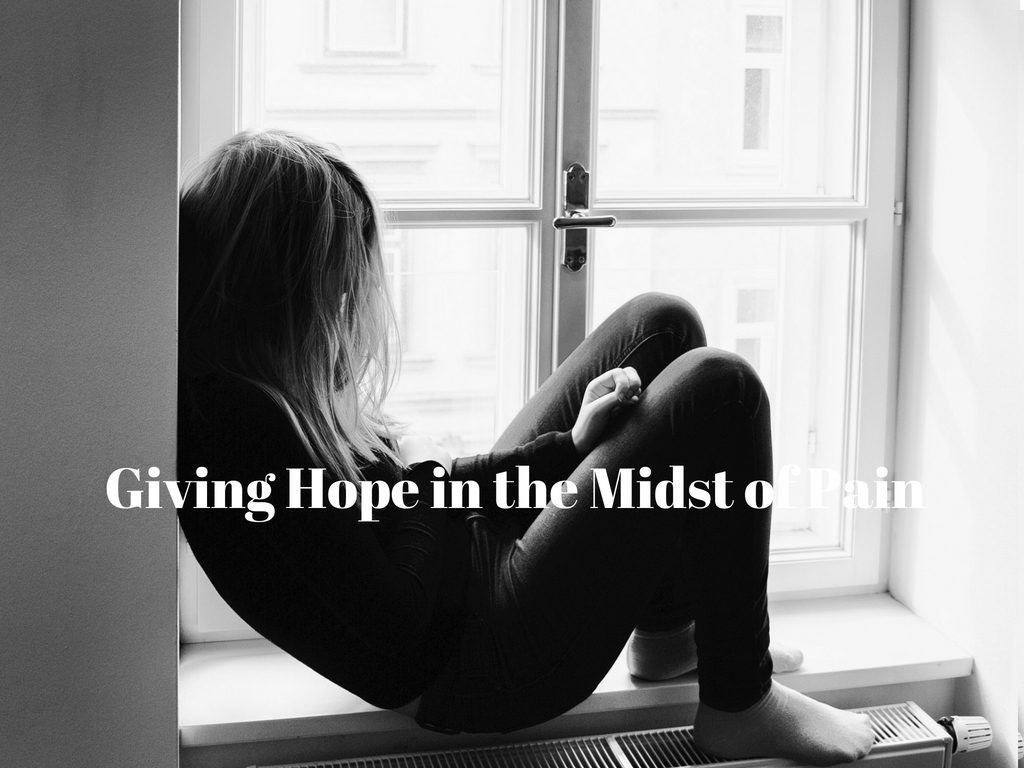Giving Hope in the Midst of Pain
“You just need to pray more.”
I remember hearing those words as my life was falling apart. I could barely muster enough strength to get through the day. The tears fell freely, like a fierce thunderstorm that sweeps in unexpectedly. My mind was cloudy, my thinking irrational, my words incoherent.
And my faith? It was non-existent. After all, I had walked faithfully with God my entire life, serving Him wherever I was needed. I had given my all to Him, and yet everything I knew was gone.
Why would I want to pray if the reward for faithfulness was a shattered life? How could I pray when I couldn’t even utter a complete sentence? How could I pray more when the only language I could speak was that of overwhelming grief and fear and anger?
Yet, my well-meaning friends encouraged me just to pray more.
Looking back, I realize those words wounded me even more deeply. Somehow, they suggested that I had not prayed enough—even though I had spent hours and weeks and months begging God to heal my marriage. The suggestion that I should just pray more came at a time in my life when I didn’t even know if I believed in God, if I wanted to follow Him. Those words came at a time when I simply could not pray.
Not a single word to God. It was quite possibly the worst words that could have been spoken to me at the time.
I recently posed the question, “What have well-meaning friends said to you in times of pain that made you feel worse instead of better?’ I expected to hear clichés and platitudes. I expected, “You just need to pray more.” What I heard was downright appalling.
The responses included the clichés. You didn’t pray enough. You just need more faith. God has a reason for your pain. You’re so strong, you can handle anything that comes your way.
Others told of condemning statements. You must have sin in your life. If you lost weight/took better care of yourself, your husband wouldn’t have looked to another woman. You need to figure out what you did to cause your marriage to end. If you were closer to God, this trial wouldn’t be happening.
And then there’s the make-my-stomach-churn statements for which I simply don’t have words.
You just need to get laid to the woman whose husband abandoned her.
A rich sugar daddy will come along and take care of you after a divorce.
I’m sorry more people didn’t pray for your daughter so she would have lived like xxx’s son said to the woman who just lost her daughter.
Some people just aren’t meant to be parents to the couple who just suffered another late term miscarriage.
You participated in your own abuse to the woman trying to cope with sexual abuse she suffered as a teenager.
I know just how you feel because I recently lost my dog to the parents at the funeral of their child.
My heart aches for these wounded souls who suffered even more abuse at the hands of their well-intentioned friends. I long to wrap them in my arms and apologize for the additional pain heaped upon them. And I burn with righteous anger toward those whose careless words left the wounded with even deeper, more gaping wounds.
It’s the human experience to want to help someone, to want to say just the right words to encourage them in their pain. It’s also strange and awkward, and we often don’t know what words to speak. We fear saying the wrong thing. And sometimes we do.
Our hearts long to be there, to be available. We want to speak words of encouragement. We want to show we care.
But we don’t know what to say.
The book of Job is a great example of friends who were well-meaning, but their words left Job feeling more discouraged, more pain. If only they had stopped when they were doing things right…
When three of Job’s friends heard of the tragedy he had suffered, they got together and traveled from their homes to comfort and console him. Their names were Eliphaz the Temanite, Bildad the Shuhite, and Zophar the Naamathite. When they saw Job from a distance, they scarcely recognized him. Wailing loudly, they tore their robes and threw dust into the air over their heads to show their grief. Then they sat on the ground with him for seven days and nights. No one said a word to Job, for they saw that his suffering was too great for words. Job 2:11-13
Job’s friends started out right. When they learned of his tragedy, they came to him. They sat with him. They mourned with him. They recognized the depth of his pain.
His friends were doing a great job ministering to him…until they opened their mouths. Some of what they said might have been true, but Job’s heart simply wasn’t ready to receive it..
Sometimes there are no words. Nothing you say can take away the pain, can heal the deep hurts. But your presence? I promise your friends will remember who was there. To this day I remember the kind souls who showed up on my doorstep, who took me to breakfast, who wrapped me in their arms. I remember the generous souls who slipped $100 in my hand, who volunteered to take my kids for a few hours. I remember…
So what can you do for your friends who are suffering greatly?
Be present. Sometimes the best thing you can do is simply be there. It’s the ministry of presence, of letting others know you care simply by your availability. Words are not always necessary.
Job’s friends got together and traveled from their homes to comfort and console Job. They knew their friend was hurting, and they needed to be with him. Their presence spoke volumes about their hearts, about their desire to be a comfort to Job in his pain.
Be silent. If you don’t know what to say, make it a simple, “I’m so sorry.” Acknowledge the hurt and the pain, but don’t offer advice or try to fix it. Don’t speak platitudes about faith. Your tears with them speak more loudly than any platitude you could offer.
Job’s friends simply sat with him in silence for the first seven days. They didn’t have words. They had tears and I imagine they prayed silently, asking God to help their dear friend. Maybe at some point they decided Job should be able to put his pain behind him, to move on. Perhaps they became impatient with his grief and that’s when they decided to open their mouths. Job’s friends spoke the clichés and the condemning words, blaming Job for sin in his life that must have brought the calamity upon him.
It would have been so much better if they had simply stopped with silence. Gave Job the opportunity to speak, to grieve, to express his pain.
Be faithful. Be faithful to pray for them. Be faithful to pray with them. Be faithful to be the hands and feet of Christ by meeting their physical needs. Mow the grass. Pick up dinner. Cook a meal. Clean their house. Simply be available to serve them as Christ would be willing to serve.
So many of my friends expressed frustration in hearing others were available, but they really weren’t. They disappeared, failed to follow through on their promises. They offered to do whatever was needed, but then never did. The Bible tell us our actions should back up our faith, that faith without deeds is dead. Make sure you are faithful to walk through the pain until the very end.
We, as the body of Christ, must learn to love in words and deeds. We must learn to contemplate the impact of our words, to measure the weight of them on a hurting soul before they leave our mouths. We must learn to love before we attempt to turn others from “the error of their ways.” We must let others know we are Christians by our love.
How are you loving others in their pain?









I get this. So much. ????
Interesting that both previous commenters touched on how they have been the one with hurtful advice. Add me to the list. Going through a divorce has humbled this self -righteous person. I’m thankful for that and your blog post is a confirmation that I need to remember my friends who are in similar situations that I’ve been in as I’ve walked (crawled?) this journey. I’m in a place where I am able and need to reach out to these hurting sisters because I’ve been there and I know the pain. Thanks –
I wish I could have put all of my feelings like this into words. Thank you for sharing, it all hit home with me.
So good! I used to be that advice-giver who had all the answers and knew exactly what the other person “needed” to do–oh how wrong I was! Now I try to just create safe spaces for people without judgment or rules or “fixing” anything.
Your post reminded me of this video by Brene Brown about empathy: https://www.youtube.com/watch?v=1Evwgu369Jw
Thank you for writing this! Every word of it burned in my heart. I have been that well meaning friend who spoke wrongly and I have been the person whose friends spoke wrongly to me. Since my divorce, I have become much more comfortable with sitting in silence with friends who are hurting. Maybe we go to lunch or the movies, but I never now give advice or platitudes unless specifically asked and even then I am cautious. Well meaning Christian friends can be unintentionally cruel when they speak.